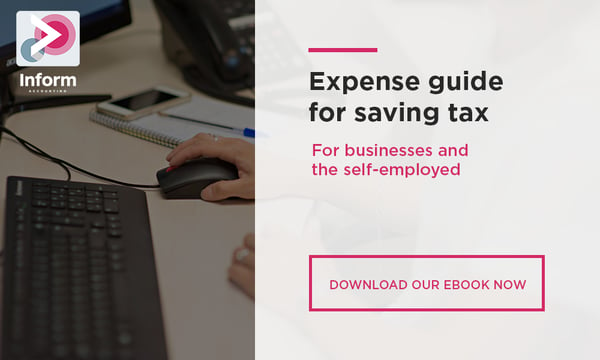BLOG COMPANY TAXES, EXPENSES & RATES
12 Accounting Tips this Christmas
As the holiday season approaches, businesses are not just decking the halls - they’re also closing the books for the year. Here are 12 accounting tips wrapped up in a festive Christmas theme to help you keep your finances as merry and bright as your Christmas tree lights!
1. Charitable donations - the gift that gives back
If you’re in the giving spirit, remember that donations to qualified charities are tax-deductible. Whether it's a monetary donation, food for holiday drives, or even volunteer work expenses, these contributions can reduce your taxable income.
In the UK, charitable donations made under the Gift Aid scheme can increase the value of your donation by 25%, as charities can claim back 25p every time you donate £1. Additionally, if you’re a higher or additional rate taxpayer, you can claim back the difference between the basic rate of tax (20%) and your higher rate on your donation.
We're Supporting Children's Hospital and Blood Donations This Year!
At Inform, we're committed to giving back to our community and making a positive impact on the lives of others. This holiday season, we're proud to announce that we'll be donating to Birmingham Children's Hospital and NHS Blood Donations.
Birmingham Children's Hospital is a leading provider of paediatric healthcare, offering a wide range of services to children from birth to young adulthood. NHS Blood Donations is a vital organisation that collects, processes, and distributes blood products to hospitals and patients in need.
To learn more about Children's Hospital and Blood Donations, or to make a donation, please visit their websites:
2. Christmas Charity Events and Sponsorship
Sponsoring a charity event during the festive season can be a great way to give back to the community and reduce your taxable income. Payments made for sponsorship that include advertising or promotional benefits for your business can be treated as allowable business expenses.
3. Christmas Bonuses and Employee Gifts
Christmas bonuses and gifts to employees can be a thoughtful way to reward hard work, and they can also be tax-efficient. Cash bonuses are subject to PAYE and National Insurance Contributions (NICs), but small gifts, known as "trivial benefits," are tax-free. These trivial benefits must not exceed £50 per employee and cannot be cash or a cash voucher.
4. Holiday Parties and Staff Entertaining
If you’re planning a Christmas party for your staff, the cost can be a tax-deductible expense for your business, provided it meets the criteria. The total cost per head must not exceed £150 annually, including VAT, and the event must be open to all employees. If the party is within these limits, there’s no benefit-in-kind tax for employees.
5. Seasonal Gifting to Clients
Small business gifts to clients can also be tax-deductible, provided they are not food, drink, tobacco, or vouchers, and the cost does not exceed £50 per recipient per year. These gifts must carry a conspicuous advertisement for your business, such as branded items.
6. Prepare for Holiday Sales
If your business experiences a boost in holiday sales, make sure you’re ready. Stock up on inventory, ensure your point-of-sale system is functioning smoothly, and consider the impact on your cash flow.
7. Review Your Budget: Naughty or Nice?
Review your annual budget to see where you've been naughty (overspending) or nice (under budget). This will help you make adjustments for the coming year.
8. Year-End Capital Expenditures
Consider making necessary capital expenditures before the end of your accounting period to take advantage of the Annual Investment Allowance (AIA). The AIA allows businesses to deduct the full value of qualifying assets, such as equipment or machinery, from profits before tax, up to a certain limit.
You can check out our blog article which digs deeper into the AIA, what it is and how it works here.
9. Inheritance Tax (IHT) Exemptions
Christmas is a time for giving, and if you’re considering making financial gifts to loved ones, remember the annual Inheritance Tax exemptions. You can give away up to £3,000 per tax year without it being added to the value of your estate for IHT purposes. If you didn’t use last year’s exemption, you can carry it forward, allowing you to give away £6,000 this Christmas.
10. Plan for the New Tax Year
As you enjoy the holiday season, it's also a good time to start planning for the new tax year. Review your finances, consider any potential changes in tax laws, and adjust your strategies to ensure you continue to benefit from available tax reliefs.
11. Stay on Top of Accounts Receivable
Send out invoices promptly and follow up on any outstanding payments. Santa might be okay waiting a year to deliver gifts, but your business needs cash flow to keep running smoothly.
12. Enjoy the Season - Stress-Free
Finally, after all your accounting tasks are in order, take some time to enjoy the holiday season. Whether it’s a cup of eggnog or a festive gathering, ’tis the season to be jolly!
Summary
By making the most of these UK-specific tax benefits and deductions, you can ensure that your business remains financially healthy while you enjoy a festive and tax-efficient Christmas. As always, consult with a tax advisor to ensure you’re making the best decisions for your specific circumstances.




.jpg?width=1500&height=1000&name=amy-hirschi-K0c8ko3e6AA-unsplash-(5).jpg)

